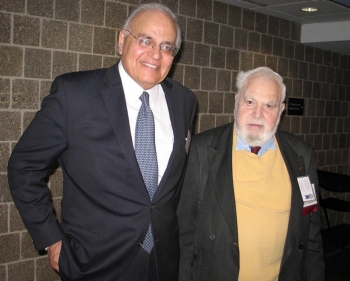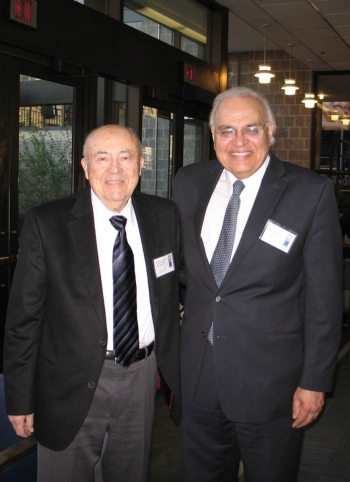Center for Advanced Communications Honors Benjamin Franklin Medal Winner

CAC Director Dr. Moeness Amin with Dr. Solomon Golomb, recipient of the 2016 Benjamin Franklin Medal in Electrical Engineering.
As part of Franklin Institute Awards Week, the Center for Advanced Communications (CAC) and Villanova University hosted a symposium to honor Dr. Solomon Golomb, recipient of the 2016 Benjamin Franklin Medal in Electrical Engineering. Dr. Golomb, professor of Electrical Engineering at the University of Southern California, was recognized by the Franklin Institute “For pioneering leadership in digital space communications; for the theory and design of efficient high time-bandwidth spread spectrum waveforms, including pseudo-random shift register sequences; and for radar/sonar waveform applications of the Golomb Ruler.” CAC Director Dr. Moeness Amin says, “We were very pleased to honor Dr. Golomb, whose work is at the foundation of many advances in radar, communications, and satellite navigations.”

Dr. Amin with Dr.Andrew Viterbi, recipient of the 2005 Benjamin Franklin Medal in Electrical Engineering.
Co-sponsored by the Franklin Institute and the IEEE Philadelphia Section, the “Workshop on Shift Register Sequences” focused on Dr. Golumb’s signature area of expertise, waveform design and coding. In addition to the honoree, event speakers included 2005 Benjamin Franklin Medalist Dr. Andrew Viterbi, Viterbi Group LLC, San Diego; Dr. Guang Gong, University of Waterloo, Ontario, Canada; Dr. Tor Helleseth, University of Bergen, Norway; and Dr. Alfred W. Hales, IDA Center for Communications Research, San Diego.
The Franklin Institute Awards program began in Philadelphia in 1824 in an effort to expand the scientific knowledge base of mechanics and artisans. In the many years since, it has evolved into the Benjamin Franklin Medals, which are given yearly in the categories of chemistry, civil and mechanical engineering, computer and cognitive science, Earth and environmental science, electrical engineering, life science, and physics. The Franklin Institute has a storied past—117 laureates have also been awarded a Nobel Prize, and include household names such as Thomas Edison, Bill Gates, Marie Curie, and Albert Einstein.
